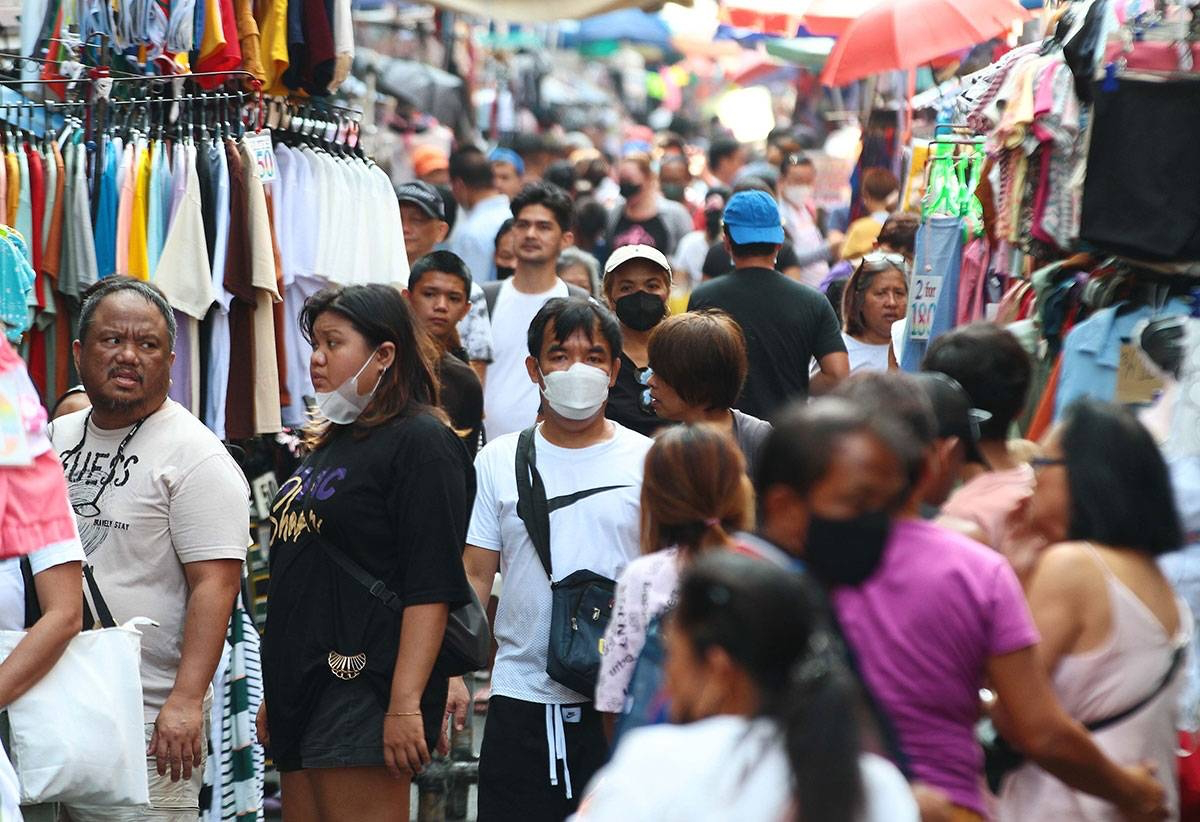New Covid subvariant now in 33 countries
Some citizens are seen wearing facemasks while other choose not to wear one, along Ilaya Street in Binondo, Manila. Health Officer in charge Maria Rosario Vergeire does not see the need to reimpose more stringent restrictions such as mandatory masking even if cases of Covid-19 continue to increase in the country. (PHOTO: MIKE ALQUINTO)
The Philippines has detected its first case of the Arcturus or XBB.1.16 subvariant, the Department of Health (DoH) said Tuesday.
The subvariant was found in a sample from Western Visayas and is one of the 89 samples that had Omicron subvariants during the latest sequencing run of the University of the Philippines-Philippine Genome Center, Research Institute for Tropical Medicine, and San Lazaro Hospital from April 12-17.
Arcturus is a sublineage of the XBB subvariant that was recently added to the list of subvariants under monitoring by the World Health Organization and the European Center for Disease Control.
It has been detected in 33 countries.
“Limited information is available for the variant and researchers are currently characterizing the variant in terms of transmissibility, immune evasion, and ability to cause more severe disease,” the DoH said.
Public health expert Dr. Tony Leachon also warned the public against the Arcturus XBB.1.16 variant, which started in India.
Its symptoms are fever, cough, sore throat, and conjunctivitis or sore eyes.
“This should be something we should watch out for, but we should not panic because these are milder cases,” Leachon said.
“I don’t think there will be an increase in the hospitalization rate. And I can assure the public there will not be any economic lockdown, basically because of the milder cases that we’re seeing right now, not only in the Philippines but also in other parts of the world.”
As of April 23, the Covid-19 positivity rate was at 10.9 percent, although the health care utilization rate remains low.
Leachon said the wearing of masks should be mandatory to prevent viral transmissions.
Getting a second booster shot against Covid-19 for the general population is a “welcome opportunity,” he added.
“The general population is actually the vulnerable one,” he said, citing a Philippine Statistics Authority report that it is this group that could be more prone to getting the virus.
Leachon said the public should be concerned that 26 provinces have been placed under Alert Level 2 by the Inter-Agency Task Force for the Management of Emerging Infectious Diseases (IATF-EID).
“It’s something the public should be concerned about, but we should not panic because most of these cases will be milder,” he said in a video interview with The Manila Times.
The provinces of Benguet, Ifugao, Quezon, Palawan, Camarines Norte, Masbate, Antique, Negros Occidental, Bohol, Cebu, Negros Oriental, Leyte, Western Samar, Lanao del Norte, Davao de Oro, Davao del Norte, Davao del Sur, Davao Occidental, North Cotabato, Sarangani, Sultan Kudarat, Dinagat Islands, Basilan, Maguindanao, Sulu and Tawi-Tawi are under Alert Level 2 until April 30.
Leachon cited a World Health Organization (WHO) declaration last January that the world is still under a public health emergency and that the pandemic is not yet in the endemic stage, but at a “transition point.”
“We are in a transition point where we have mild Covid cases, but we are not out of the woods yet,” he said in a Viber message to The Times.
“We will have episodic surges due to poor vaccination, waning immunity and lack of bivalent vaccines. We need to prepare the population if we need to open up the economy to investors and revitalize major industries,” Leachon added.
No need
Health Officer in charge Maria Rosario Vergeire does not see the need to reimpose more stringent restrictions such as mandatory masking even if cases of Covid-19 continue to increase in the country.
The Health department reported that there was a 32 percent rise in Covid-19 cases in the country during the week of April 17 to 23, translating to a daily average caseload of 450 cases per day.
During a media briefing at the sidelines of the Malaria-Free Awarding Ceremony in Quezon City on Tuesday, Vergeire shot down suggestions that there should be more restrictions in mobility among the unvaccinated and the resumption of mandatory masking. She instead urged the public to be more cautious and vigilant.
“Every one of us has the right to know what our risks are so that we will know if we would wear our masks or not,” Vergeire said.
It is also counterproductive to reimpose restrictions now that the economy is slowly moving back on track after two years of lockdowns, she added.
She said the increase in the number of cases should not be attributed to the Holy Week exodus, but to the presence of more transmissible Covid-19 variants and the interaction of people during the dry season, among other things.
She noted that the IATF-EID has not elevated some provinces under Alert Level 2, explaining that the 26 areas remained under Alert Level 2 because of the level of vaccinations there.
Vergeire said the IATF’ s new policy on the alert level system was still being discussed, specifically on the “decoupling” of the restrictions to the alert level system and that the system would just be used as a “warning signal” as a guide for local government units.
“We gave local governments the flexibility [to implement restrictions] as long as we follow the layers of protection to prevent more people from getting sick,” she added.
Vergeire said the local government units were enjoined to implement the vaccination of second booster doses as the guidelines for its administration have been issued, and urged the public to get their booster shots at the nearest health center.

